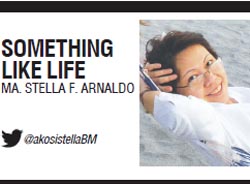
A FEW days ago, on one of those rare weekday downtimes, I was watching a Bewitched rerun on cable TV.
A sitcom I relished as a young child in the 1970s, Bewitched is about a young witch named Samantha (Elizabeth Montgomery) who is married to advertising copywriter Darrin Stephens (Dick York), a mortal. Samantha promises to limit using her magical powers as Darrin wants to live as “normal” a life as possible. (Back in those days, “normal” meant husbands went to work while wives stayed home to cook their husband’s meals and clean the house.)
In that particular episode, Darrin was asked by his boss, Larry Tate, to prepare an advertising poster for a store’s Halloween promo. In the poster, Darrin draws the stereotypical witch as an ugly old hag, with a wart on her nose and a pointy black hat. Not surprisingly, Samantha is mortified and complains to Darrin that witches would be insulted by such an ugly depiction. Come on, Darrin, just take a look at your blond and beautiful wife.
Darrin tries to convince Mr. Tate to drop the old hag treatment for witches for a more physically attractive depiction. The latter is unconvinced and Darrin is kicked off the campaign when he refuses to go along with Mr. Tate wants. I’ll spare you the rest of the story but suffice to say that in the end, Mr. Tate comes around to Darrin’s view, thanks to the supernatural visit of Samantha and her witch-aunts in Mr. Tat’s dreams.
I recall the episode with amusement as I read through the many comments and numerous criticisms heaped on a new ad by this popular dermatologist. I saw the ad, which had a young woman seated on a sofa, slowly gaining weight, then sporting a unibrow and a mustache, zits popping up on her face, as she watched pandemic news on her TV. The ad ends with her answering a video call on her laptop, as a friend asks how she is: “Anong nangyari? [What happened?]”
The ad tried to be light and comedic, I suppose, but it was hardly groundbreaking and clever in execution, which are the things that many had come to expect from the advertising agency that created it. On one hand, it was probably what the agency was aiming for—an ad that would grate on the nerves of people so much, they would keep talking about it and their client. Good news or bad news, it’s still publicity, right?
Maybe it was meant to spark a conversation about real beauty, as it now has. Or, on the other hand, am I giving the creators too much credit, considering who their client is?
But let’s face it, ladies—and yes, gentlemen too.
Many of us put a premium of good looks and physical assets when sizing up other people, whether it be in social circles or the workplace. Even friends or relatives whom we haven’t seen for a long time, we usually greet with, “Uy tumaba ka! Looking prosperous ha!” Or “Parang pumayat ka, ate? May sakit ka ba?” (The annoying custom is particular to Filipinos; I have never been on the receiving end of that kind of greeting from friends of other nationalities.)
We trade on looks mainly because this is the first thing we see—the physical appearance of others. Judgements are immediately formed based on how we perceive others: a fat man is thought of as lazy and won’t probably be a good asset to the office team; a slender woman is energetic and will probably make that sale with the client.
These perceptions and judgements about a person’s character based on looks have been formed through years of watching movies or cartoons, reading comic books, and these are reinforced by product advertising—yes, much like Dr. Derma’s ad.
So sure, Dr. Derma wants to blame the pandemic as the reason many women “let themselves go.” I cop to eating more sweets than before, not exercising as the many lockdowns have kept me from my regular walks, and letting my hair go longer and white. I’m too busy moving on from one Zoom news conference to another to actually care if I’ve been on a healthy diet.
Similarly, others who are working from home may have children to take care of and are trying to find ways to entertain their kids while rushing to finish a hundred and one projects for the office. It can be quite a challenge, and the only measure of comfort can be a tub of potato chips or ice cream.
Others have totally lost their jobs, and have gone back to living with their senior parents or other relatives. They scrape by, selling whatever products online or taking on odd work here and there. Putting on lipstick and tweezing the eyebrows are the farthest things from their mind.
So excuse us for focusing more on what matters most during this pandemic—family, earning a living, trying to protect ourselves from the virus, and keeping ourselves sane. We can’t go traipsing around Paris with family and alalays in tow, with the only concern being to make sure everyone’s passport is safe in our handbag. Too bad, our real lives suck, huh?
Image courtesy of Erik Mclean on Unsplash
